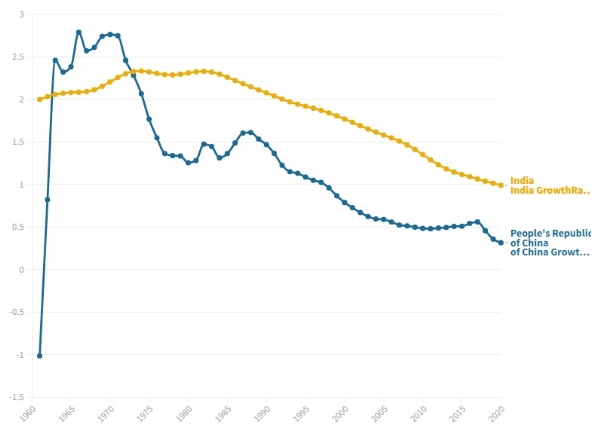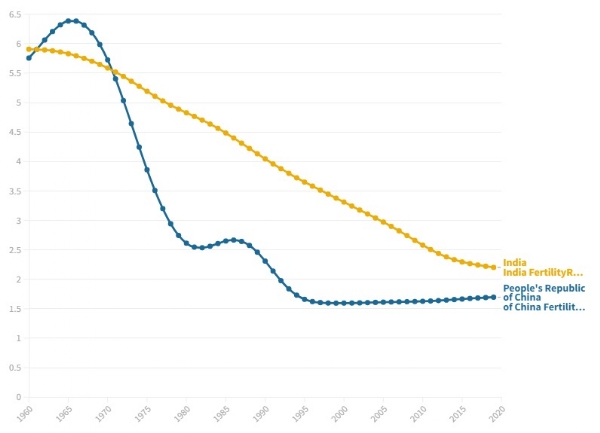Why Nana Patekar is wrong about 'this'
The intention is not to single out Nana Patekar and criticize him on this matter, but to argue that almost everyone of that generation and thereabout, are of similar socialist economic thinking, mostly as a result of being born in the socialist "golden age" of 50s, 60s, and 70s.
Total Views |
Population control, overpopulation, and the population bomb being set to explode, these are the things we keep hearing about. Even before our Independence from the British, but certainly, ever since, India’s population was always discussed as a problem. A problem which would become such a monster that it would lead to hunger, malnutrition, and starvation. These are the things we keep hearing about even today. On Tuesday, October 11th, 2022, the famous Marathi actor Nana Patekar also talked along similar lines. He asked if the government has any plan for population control.

In 2022, when the government of India has been distributing a huge amount of food material to over 80 crore people for over 3 years continuously. When it has been more than a decade since we read about India’s grain storage being full o the brink and the over-storage resulting in food waste. Even in this environment people, distinguished people like Nana Patekar are also discussing the issue of overpopulation. These discussions and the viewpoint of the likes of Nana Patekar show a very deep-rooted socialist view of economics. The intention is not to single out Nana Patekar and criticize him on this matter, but to argue that almost everyone of that generation and thereabout, are of similar socialist economic thinking, mostly as a result of being born in the socialist 'golden age' of 50s, 60s, and 70s.
Also Read: Why Urbanization is a necessity in India
The idea that population growth has to be controlled to maintain a sustainable life is known as Malthusianism. Thomas Robert Malthus, an English economist who wrote a book named, ‘An Essay on the Principle of Population’ in 1798. His theory in that book is known as Malthusianism. Malthus himself was much influenced by his father who was a contemporary of the famous French revolution philosopher Jean-Jacques Rousseau who himself promoted agrarianism and autarky. Malthusianism is the idea that population growth is potentially exponential while the growth of the food supply or other resources is linear, which eventually reduces living standards to the point of triggering a population die-off. This event, called a Malthusian catastrophe (also known as a Malthusian trap, population trap, Malthusian check, Malthusian crisis, Malthusian spectre, or Malthusian crunch) occurs when population growth outpaces agricultural production, causing famine or war, resulting in poverty and depopulation. Such a catastrophe inevitably has the effect of forcing the population (quite rapidly, due to the potential severity and unpredictable results of the mitigating factors involved, as compared to the relatively slow time scales and well-understood processes governing unchecked growth or growth affected by preventive checks) to "correct" back to a lower, more easily sustainable level. This theory and similar theories of economics have led to European colonization, the genocide of Red Indians, as they were foolishly called, mass starvation (Holodomor) in Ukraine under Stalin, and Hitler’s dream of Lebensraum. In more recent times, the imminent population collapse in China as a result of the one-child policy is the result of the same limited resources theory.
On the other hand, Dr. Marian Tupy and Dr. Gale Pooly wrote a book called Superabundance, in which they have shown the number of hours a person needed to work to get an hour of light after dark and a Kilogram of sugar. The costs of those things have collapsed over the past two centuries and even more dramatically after the Second World War. The families which lived on rationed food, almost no electricity, and slept in a dark cold room just 70 years ago. Today, their descendants don't know what hunger is, don't know what lack of electricity is, and don't know what sleeping in a dark cold room is. Meanwhile, the population has increased many folds in the last 70 years. The world has literally never had more food produced in its entire recorded history than today. The world never had more population than today and yet there is no shortage of food in the world. This has been achieved because of innovation and free market capitalism. This is not to say that everything is good and there is no hunger or poverty in the world, but today hunger and poverty exist not because of the scarcity of food and other resources but mainly due to the poor logistics and poor (socialist) economic policies.
Also Read: The Iran #Hijab delusion
As far as India’s population is concerned, it is already coming down. India’s population growth rate was already at 0.989 in 2020, from the highs of 2.33 in mid 19702 and 1980s. Whereas China has gone from 2.75 to 0.314 in the same period. This collapse of the population is what causes problems in China and this is just the beginning of their problems.

Meanwhile, the fertility rate in India has also come down from the peak of 5.79 in the mid-60s to 2.2 in 2020. Meanwhile China, in the same period collapsed from 6.38 to 1.70. This is a rare example of good policies by India to reduce the population by ‘nudge’ than by law as China did.

This is why a population control bill as Nana Patekar suggested would be catastrophic. This is not to argue that there are no challenges regarding population in India. There are challenges of demographic change as the DCM of Maharashtra Devendra Fadnavis talked about in the same program or as the RSS Sarsanghchalak Mohan Bhagwat spoke about during his Dussehra speech. The challenge of the population increase of the Muslim community especially in border areas as well as some pockets in other parts is a big reason to worry. Muslim community’s population crossing a certain threshold leads to a massive social and political interest which we witnessed in 1947. So avoiding that is absolutely necessary. But overpopulation leading to food shortage and that leading to wars is simply a Malthusian hysteria.


